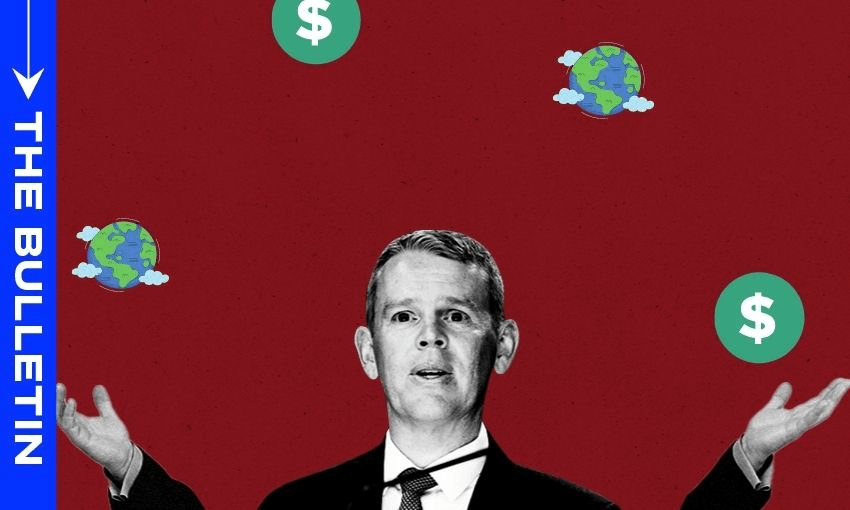After months of reprioritisation, Chris Hipkins is now looking towards the next term. This week’s batch of climate policies has left some asking for a vision that extends beyond that, writes Anna Rawhiti-Connell in this excerpt from The Bulletin, The Spinoff’s morning news round-up. To receive The Bulletin in full each weekday, sign up here.
Third term vision coming
On Saturday, election hoardings will begin dotting the landscape as the pre-election advertising period officially starts. In a wide-ranging interview with Toby Manhire for Gone by Lunchtime, prime minister and Labour leader Chris Hipkins is promising a gear switch after months of reprioritisation, and a laying out of a vision for the third term he seeks. As Manhire writes, the shift is likely to be heralded this weekend as Hipkins unveils what is expected to be the Labour Party’s long-awaited tax policy. The vision comes with a caveat. Echoing finance minister Grant Robertson’s recent caution that the fiscal weather means “it’s not going to be possible to make big promises”, Hipkins says “We do have to be realistic about the fact that in the current economic environment, it is going to be a modest election campaign.”
You can listen to the full interview here, on Spotify or wherever you get your podcasts.
The week in climate policy announcements
This week we’ve had three climate policy announcements. We started with an announcement that new wind farms and solar power projects would be fast-tracked. Newshub’s Lloyd Burr raised a few questions about some of the “if” and “could” language used. Then there was the BlackRock announcement which, as I covered yesterday, left room for more questions about what the government wants to achieve with its energy policy or climate policy (BusinessDesk, paywalled) but there was also cautious optimism. The University of Auckland’s Kevin Trenberth writes that “addressing climate change threats in New Zealand will require more than mobilising private investment with a focus on renewable energy. It will need a comprehensive and collaborative approach that acknowledges dependencies on shipping and air travel, which continue to depend on fossil fuels.” Trenbeth lists 10 ways New Zealand can be “smart and strategic” in meeting the long-term climate threat. We ended with the announcement that 12 new “high protection areas” will be created in the Hauraki Gulf to protect marine life yesterday. Ocean advocates have been left questioning why bottom trawling won’t be banned everywhere in the Hauraki Gulf.
Harbour crossing announcement fails a few sniff tests
And so we find ourselves tunnelling (sorry) back to the start of the week. Labour’s announcement on their preferred harbour crossing option had the potential to stand adjacent to something resembling climate policy, or at least as a nod towards accelerating climate-friendly transport options. Instead, we got a very expensive, very long-term vision that involves two road tunnels and a 21-kilometre light-rail tunnel. When asked “When it comes to transporting people and goods around New Zealand, which is more important?” in yesterday’s Guardian Essential poll, 72% of those surveyed said they wanted to improve other options such as public transport, coastal shipping and rail transport. Only 28% said they thought building more roads was important. Examined as an infrastructure project that might stand the test of time, BusinessDesk’s Oliver Lewis (paywalled) questioned why the announcement was made without an indicative business case.
Crossing bridges generational divide
To end, I’ll leave you with an opinion piece from my colleague Tommy de Silva which perhaps encapsulates some of the frustration at the lack of bold decisions being made. de Silva, as he describes, is a climate-anxious, 22-year-old Gen Zer and he has found himself in the perplexing position of agreeing with a 77-year-old baby boomer, Auckland mayor Wayne Brown. Ironically, this bridging of generational divides is facilitated by agreement over Labour’s harbour crossing announcement. de Silva thinks Labour’s proposal “sucks” while going on to evidence why. He makes the fair point that he would like to be able to cycle and walk some kind of harbour crossing before he’s my age (double his). Brown thinks Labour’s preferred proposal is madness. Hipkins may or may not find the much-vaunted “middle” and a third term with his caveat of moderation. However, this week’s batch of climate policies has left many asking for a vision that extends beyond the next term as scientists sound the alarm over recent extreme events in Antarctica and the world experiences its hottest month on record.


